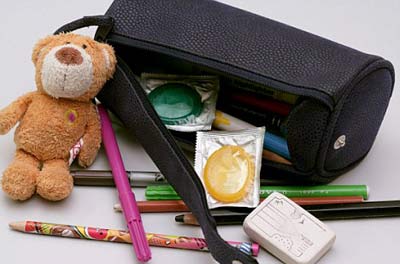|
 Subject to change? At the moment, both primary and secondary schools have to teach pupils age-appropriate lessons about the biology of sex in science. |
|
More than half of parents do not think sex education should be taught to children at school, according to a new survey. Many think it is inappropriate to teach children about sex, whilst others think it should be a parents' choice to inform their own child, according to a poll by baby product website babychild.org.uk. The survey, which questioned more than 1,700 parents of children aged five to 11, found that 59 per cent do not agree with the fact that sex education is often taught to children in schools, even from a young age. Almost half (48 per cent) of those questioned said children should be at least 13 years old before it is appropriate to teach them about sex, the survey found. Of those that don't agree that sex education should be taught in schools, 41 per cent said it was inappropriate to teach youngsters about the subject, while one in four (28 per cent) said it should be the parents' choice to teach their own child. A similar proportion (27 per cent) said there was no need for children to know about sex. Contraception was the most popular topic that parents said should be covered in sex education lessons (chosen by 65 per cent), followed by puberty (49 per cent), homosexuality (48 per cent) and sexually transmitted infections (47 per cent). At the moment, both primary and secondary schools have to teach pupils age-appropriate lessons about the biology of sex in science. The survey questioned 1,732 parents between April 26 and May 4. (Read by Lee Hannon. Lee Hannon is a journalist at the China Daily Website.) (Agencies) |
根據(jù)一項(xiàng)新調(diào)查,超過半數(shù)的父母認(rèn)為學(xué)校不應(yīng)對小孩進(jìn)行性教育。 嬰兒用品網(wǎng)站babychild.org.uk開展的一項(xiàng)調(diào)查顯示,許多父母認(rèn)為對小孩進(jìn)行性教育是不合適的,另外一些父母認(rèn)為是否讓小孩了解性應(yīng)該由父母來做決定。 該調(diào)查訪問了1700多名5到11歲孩子的父母,調(diào)查發(fā)現(xiàn),59%的父母不認(rèn)同現(xiàn)在許多學(xué)校對年幼的小孩進(jìn)行性教育的行為。 調(diào)查發(fā)現(xiàn),近半數(shù)(48%)的被調(diào)查者認(rèn)為,至少要到孩子13歲時(shí)才可以對其進(jìn)行性教育。 那些不認(rèn)同學(xué)校對小孩進(jìn)行性教育的父母中,41%的人認(rèn)為對小孩進(jìn)行性教育不合適,四分之一(28%)的人認(rèn)為是否對小孩進(jìn)行性教育應(yīng)該由父母來做決定。 相近比例(27%)的父母說,小孩沒有必要了解性。 父母認(rèn)為性教育課應(yīng)該涵蓋的話題中,避孕話題是最受歡迎的,有65%的父母選了這一話題,其次是青春期(49%)、同性戀(48%)和性傳播感染(47%)。 目前,小學(xué)和中學(xué)都必須對學(xué)生進(jìn)行和年齡相當(dāng)?shù)男陨砜茖W(xué)教育。 該調(diào)查在4月26日至5月4日期間訪問了1732位父母。 相關(guān)閱讀 英國中學(xué)和大學(xué)開設(shè)性健康咨詢室 (中國日報(bào)網(wǎng)英語點(diǎn)津 陳丹妮 編輯:馮明惠) |
|
Vocabulary: contraception: the practice of preventing a woman from becoming pregnant; the methods of doing this 避孕(法);節(jié)育(法) puberty: the period of a person's life during which their sexual organs develop and they become capable of having children(青春期) |
